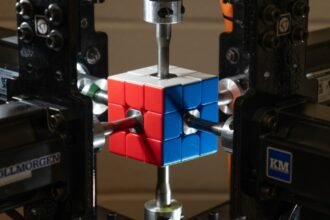The exterior design of Framework’s latest Laptop 13 remains consistent with its appearance over the past four years. However, significant enhancements have been made internally, focusing on the laptop’s modularity, upgradability, and repairability. The 2025 version now features an upgraded chipset, offering a notable advantage: any improvement introduced with the new model can be applied to devices purchased as far back as 2021.
The distinguishing feature of a Framework laptop is the ability to easily swap in a new processor and mainboard into an existing device. The Laptop 13 now boasts AMD Ryzen AI 300-series chips, maintaining Framework’s earlier commitment to a customizable and upgradable design. Users can select their preferred ports and can replace everything from RAM and SSDs to keyboards, screens, and even make cosmetic adjustments.
For 2025, the Laptop 13 introduces AMD chips starting with the Ryzen AI 5 340, priced at $1,099 in the prebuilt version, the Ryzen AI 7 350 from $1,529, and the Ryzen AI 9 HX 370 starting at $2,099. Owners of existing Framework 13 models can purchase separate mainboards: $449 for the Ryzen 340, $699 for the 350, and $999 for the HX 370.
The review unit tested is a DIY Edition, featuring the AMD Ryzen AI 7 350 processor, 32GB of RAM, a 1TB SSD, and an optional 120Hz 2880 x 1920 matte display. It came with five swappable expansion cards, including two USB-C, one USB-A, a DisplayPort, and an Ethernet port. In addition to offers like Wi-Fi 7 and a new cooling system, the Framework has made subtle improvements such as reducing vibration in longer keyboard keys when using the speakers at high volumes.
While the trackpad’s build is somewhat budget-feeling, the keyboard provides good 1.5mm key travel, albeit slightly spongier than ideal. In performance tests, the eight-core AMD Ryzen AI 7 350 displayed up to a 22 percent improvement in multicore CPU tasks over previous Framework versions, although it lagged in GPU performance compared to its competitors.
The DIY Edition offers great customization and cost-saving opportunities, especially for those willing to assemble the laptop themselves. The setup process was straightforward, aided by Framework’s detailed guides. The new laptop retains an attractive design with a productivity-friendly 3:2 screen ratio and satisfactory battery life for a full workday.
Compared to devices like the MacBook Air, the Framework Laptop 13 offers a unique advantage with its ability to be upgraded. While some components are not top-of-the-line for the price, Framework’s approach to modular design offers an unparalleled level of personalization and longevity, standing as a testament to user-focused upgradability.
Overall, the Framework Laptop 13 remains a viable and appealing choice for those prioritizing repairability and personalization in their device, with a growing marketplace for parts and upgrades that maintains its relevance against larger brands.









